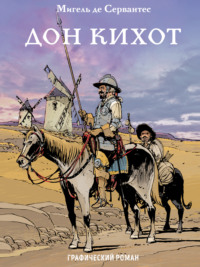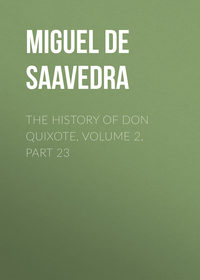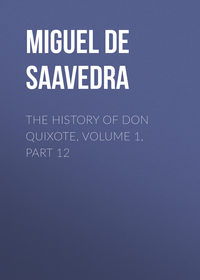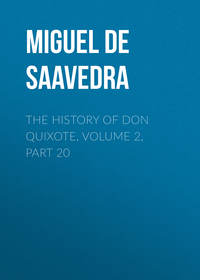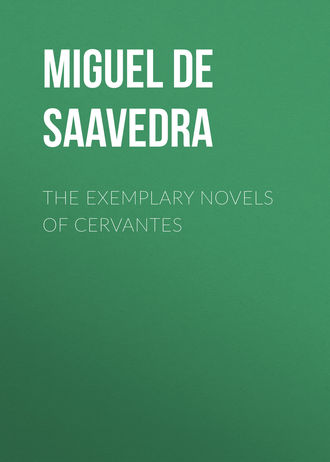 полная версия
полная версияThe Exemplary Novels of Cervantes
By this gentleman he was received with much kindness, and the latter said to him, "You are extremely welcome, Doctor Glasscase; I hope you have had a pleasant journey." Rodaja replied, that no journey could be called a bad one if it took you safe to your end, unless indeed it were that which led to the gallows.
Being one day shown the Falconry, wherein were numerous falcons and other birds of similar kind, he remarked that the sport pursued by means of those birds was entirely suitable to great nobles, since the cost was as two thousand to one of the profit.
When it pleased Rodaja to go forth into the city, the nobleman caused him to be attended by a servant, whose office it was to protect him from intrusion, and see that he was not molested by the boys of the place, by whom he was at once remarked; indeed but few days had elapsed before he became known to the whole city, since he never failed to find a reply for all who questioned or consulted him.
Among those of the former class, there once came a student, who inquired if he were a poet, to which Rodaja replied, that up to the moment they had then arrived at, he had neither been so stupid nor so bold as to become a poet. "I do not understand what you mean by so stupid or so bold, Señor Glasscase," rejoined the student; to which Rodaja made answer, "I am not so stupid as to be a bad poet, nor so bold as to think myself capable of being a good one." The student then inquired in what estimation he held poets, to which he answered that he held the poets themselves in but little esteem; but as to their art, that he esteemed greatly. His hearer inquiring further what he meant by that, Rodaja said that among the innumerable poets, by courtesy so called, the number of good ones was so small as scarcely to count at all, and that as the bad were not true poets, he could not admire them: but that he admired and even reverenced greatly the art of poetry, which does in fact comprise every other in itself, since it avails itself of all things, and purifies and beautifies all things, bringing its own marvellous productions to light for the advantage, the delectation, and the wonder of the world, which it fills with its benefits. He added further, "I know thoroughly to what extent, and for what qualities, we ought to estimate the good poet, since I perfectly well remember those verses of Ovid, wherein he says: —
"'Cura ducum fuerunt olim regumque poetæ,Præmiaque antiqui magna tulere chori.Sanctaque majestas, et erat venerabile nomenVatibus; et largæ sæpe dabantur opes.'And still less do I forget the high quality of the poets whom Plato calls the interpreters of the Gods, while Ovid says of them —
"'Est deus in nobis; agitante calescimus illo.'And again —
"'At sacri vates et divum cura vocamur.'"These things are said of good poets; but, as respects the bad ones – the gabbling pretenders – what can we say, save only that they are the idiocy and the arrogance of the world.
"Who is there that has not seen one of this sort when he is longing to bring forth some sonnet to the ears of his neighbours? How he goes round and round them with – 'Will your worships excuse me if I read you a little sonnet, which I made one night on a certain occasion; for it appears to me, although indeed it be worth nothing, to have yet a certain something – a je ne scai quoi of pretty, and pleasing.' Then shall he twist his lips, and arch his eyebrows, and make a thousand antics, diving into his pockets meanwhile and bringing out half a hundred scraps of paper, greasy and torn, as if he had made a good million of sonnets; he then recites that which he proffered to the company, reading it in a chanting and affected voice.
"If, perchance, those who hear him, whether because of their knowledge or their ignorance, should fail to commend him, he says, 'Either your worships have not listened to the verses, or I have not been able to read them properly, for indeed and in truth they deserve to be heard;' and he begins, as before, to recite his poem, with new gestures and varied pauses.
"Then to hear these poetasters censure and tear one another to pieces! And what shall I say of the thefts committed by these cubs and whelps of modern pretence on the grave and ancient masters of the art, or of their malevolent carpings at those excellent persons of their own day in whom shines the true light of poetry; who, making a solace and recreation of their arduous labours, prove the divinity of their genius and the elevation of their thoughts to the despite and vexation of these ignorant pretenders, who presume to judge that of which they know nothing, and abhor the beauties which they are not able to comprehend? What will you have me esteem in the nullity which seeks to find place for itself under the canopy spread for others – in the ignorance which is ever leaning for support on another man's chair?"
Rodaja was once asked how it happened that poets are always poor; to which he replied, "That if they were poor, it was because they chose to be so, since it was always in their power to be rich if they would only take advantage of the opportunities in their hands. For see how rich are their ladies," he added; "have they not all a very profusion of wealth in their possession? Is not their hair of gold, their brows of burnished silver, their eyes of the most precious jewels, their lips of coral, their throats of ivory and transparent crystal? Are not their tears liquid pearls, and where they plant the soles of their feet do not jasmine and roses spring up at the moment, however rebellious and sterile the earth may previously have been? Then what is their breath but pure amber, musk, and frankincense? Yet to whom do all these things belong, if not to the poets? They are, therefore, manifest signs and proofs of their great riches."
In this manner he always spoke of bad poets; as to the good ones, he was loud in their praise, and exalted them above the horns of the moon.
Being at San Francisco, he one day saw some very indifferent pictures, by an incapable hand; whereupon he remarked that the good painters imitate nature, while the bad ones have the impertinence to daub her face.
Having planted himself one day in front of a bookseller's shop with great care, to avoid being broken, he began to talk to the owner, and said, "This trade would please me greatly, were it not for one fault that it has." The bookseller inquiring what that might be, Rodaja replied, "It is the tricks you play on the writers when you purchase the copyright of a book, and the sport you make of the author if, perchance, he desire to print at his own cost. For what is your method of proceeding? Instead of the one thousand five hundred copies which you agree to print for him, you print three thousand; and when the author supposes that you are selling his books, you are but disposing of your own."
One of those men who carry sedan-chairs, once standing by while Rodaja was enumerating the faults committed by various trades and occupations, remarked to the latter, "Of us, Señor Doctor, you can find nothing amiss to say." "Nothing," replied Rodaja, "except that you are made acquainted with more sins than are known to the confessor; but with this difference, that the confessor learns them to keep all secret, but you to make them the public talk of the taverns."
A muleteer who heard this, for all kinds of people were continually listening to him, said aloud, "There is little or nothing that you can say of us, Señor Phial, for we are people of great worth, and very useful servants to the commonwealth." To which the man of glass replied, "The honour of the master exalts the honour of the servant. You, therefore, who call those who hire your mules your masters, see whom you serve, and what honour you may borrow from them; for your employers are some of the dirtiest rubbish that this earth endures.
"Once, when I was not a man of glass, I was travelling on a mule which I had hired, and I counted in her master one hundred and twenty-one defects, all capital ones, and all enemies to the human kind. All muleteers have a touch of the ruffian, a spice of the thief, and a dash of the mountebank. If their masters, as they call those they take on their mules, be of the butter-mouthed kind, they play more pranks with them than all the rogues of this city could perform in a year. If they be strangers, the muleteers rob them; if students, they malign them; if monks, they blaspheme them; but if soldiers, they tremble before them. These men, with the sailors, the carters, and the arrieros or pack carriers, lead a sort of life which is truly singular, and belongs to themselves alone.
"The carter passes the greater part of his days in a space not more than a yard and a half long, for there cannot be much more between the yoke of his mules and the mouth of his cart. He is singing for one half of his time, and blaspheming the other; and if he have to drag one of his wheels out of a hole in the mire, he is more aided, as it might seem, by two great oaths than by three strong mules.
"The mariners are a pleasant people, but little like those of the towns, and they can speak no other language than that used in ships. When the weather is fine they are very diligent, but very idle, when it is stormy. During the tempest they order much and obey little. Their ship, which is their mess-room, is also their god, and their pastime is the torment endured by sea-sick passengers.
"As to the mule-carriers, they are a race which has taken out a divorce from all sheets, and has married the pack-saddle. So diligent and careful are these excellent men, that to save themselves from losing a day, they will lose their souls. Their music is the tramp of a hoof; their sauce is hunger; their matins are an exchange of abuse and bad words; their mass is – to hear none at all."
While speaking thus, Rodaja stood at an apothecary's door, and turning to the master of the shop, he said, "Your worship's occupation would be a most salutary one if it were not so great an enemy to your lamps."
"Wherein is my trade an enemy to my lamps?" asked the apothecary.
"In this way," replied Rodaja; "whenever other oils fail you, immediately you take that of the lamp, as being the one which most readily comes to hand. But there is, indeed, another fault in your trade, and one that would suffice to ruin the most accredited physician in the world." Being asked what that was, he replied that an apothecary never ventured to confess, or would admit, that any drug was absent from his stock; and so, if he have not the medicine prescribed, he makes use of some other which, in his opinion, has the same virtues and qualities; but as that is very seldom the case, the medicine, being badly compounded, produces an effect contrary to that expected by the physician.
Rodaja was then asked what he though, of the physicians themselves, and he replied as follows: "Honora medicum propter necessitatem, etenim creavit cum altissimus: à Deo enim est omnis medela, et a rege accipiet donationem: disciplina medici exaltavit caput illius, et in conspectu magnatum collaudabitur. Altissimus de terra creavit medicinam, et vir prudens non abhorrebit illam. Thus," he added, "speaketh the Book of Ecclesiasticus, of Medicine, and good Physicians; but of the bad ones we may safely affirm the very contrary, since there are no people more injurious to the commonwealth than they are. The judge may distort or delay the justice which he should render us; the lawyer may support an unjust demand; the merchant may help us to squander our estate, and, in a word, all those with whom we have to deal in common life may do us more or less injury; but to kill us without fear and standing quietly at his ease; unsheathing no other sword than that wrapped in the folds of a recipe, and without being subject to any danger of punishment, that can be done only by the physician; he alone can escape all fear of the discovery of his crimes, because at the moment of committing them he puts them under the earth. When I was a man of flesh, and not of glass, as I now am, I saw many things that might be adduced in support of what I have now said, but the relation of these I refer to some other time."
A certain person asked him what he should do to avoid envying another, and Rodaja bade him go to sleep, for, said he, "While you sleep you will be the equal of him whom you envy."
It happened on a certain occasion that the Criminal Judge passed before the place where Rodaja stood. There was a great crowd of people, and two alguazils attended the magistrate, who was proceeding to his court, when Rodaja inquired his name. Being told, he replied, "Now, I would lay a wager that this judge has vipers in his bosom, pistols in his inkhorn, and flashes of lightning in his hands, to destroy all that shall come within his commission. I once had a friend who inflicted so exorbitant a sentence in respect to a criminal commission which he held, that it exceeded by many carats the amount of guilt incurred by the crime of the delinquents. I inquired of him wherefore he had uttered so cruel a sentence, and committed so manifest an injustice? To which he replied that he intended to grant permission of appeal, and that in this way he left the field open for the Lords of the Council to show their mercy by moderating and reducing that too rigorous punishment to its due proportions. But I told him it would have been still better for him to have given such a sentence as would have rendered their labour unnecessary, by which means he would also have merited and obtained the reputation of being a wise and exact judge."
Among the number of those by whom Rodaja, as I have said, was constantly surrounded, was an acquaintance of his own, who permitted himself to be saluted as the Señor Doctor, although Thomas knew well that he had not taken even the degree of bachelor. To him, therefore, he one day said, "Take care, gossip mine, that you and your title do not meet with the Fathers of the Redemption, for they will certainly take possession of your doctorship as being a creature unrighteously detained captive."
"Let us behave well to each other, Señor Glasscase," said the other, "since you know that I am a man of high and profound learning."
"I know you rather to be a Tantalus in the same," replied Rodaja; "for if learning reach high to you, you are never able to plunge into its depths."
He was one day leaning against the stall of a tailor, who was seated with his hands before him, and to whom he said —
"Without doubt, Señor Maeso,56 you are in the way to salvation."
"From what symptom do you judge me to be so, Señor Doctor?" inquired the tailor.
"From the fact that, as you have nothing to do, so you have nothing to lie about, and may cease lying, which is a great step."
Of the shoemakers he said, that not one of that trade ever performed his office badly; seeing that if the shoe be too narrow, and pinches the foot, the shoemaker says, "In two hours it will be as wide as an alpargate;" or he declares it right that it should be narrow, since the shoe of a gentleman must needs fit closely; and if it be too wide, he maintains that it still ought to be so, for the ease of the foot, and lest a man should have the gout.
Seeing the waiting-maid of an actress attending her mistress, he said she was much to be pitied who had to serve so many women, to say nothing of the men whom she also had to wait on; and the bystanders requiring to know how the damsel, who had but to serve one, could be said to wait on so many, he replied, "Is she not the waiting-maid of a queen, a nymph, a goddess, a scullery-maid, and a shepherdess? besides that she is also the servant of a page and a lackey? for all these, and many more, are in the person of an actress."
Some one asked Rodaja, who had been the happiest man in the world? To which he answered – "Nemo, seeing that Nemo novit patrem – Nemo sine crimine vivit – Nemo sua sorte contentus – Nemo ascendit in coelum," &c. &c.
Of the fencing masters he said, that they were professors of an art which was never to be known when it was most wanted, since they pretended to reduce to mathematical demonstrations, which are infallible, the angry thoughts and movements of a man's adversaries.
To such men as dyed their beards, Rodaja always exhibited a particular enmity; and one day observing a Portuguese, whose beard he knew to be dyed, in dispute with a Spaniard, to whom he said, "I swear by the beard that I wear on my face," Rodaja called out to him, "Halt there, friend; you should not say that you wear on your face, but that you dye on your face."57 To another, whose beard had been streaked by an imperfect dye, Doctor Glasscase said, "Your beard is of the true dust-coloured pieball." He related, on another occasion, that a certain damsel, discreetly conforming to the will of her parents, had agreed to marry an old man with a white beard, who, on the evening before his marriage was to take place, thought fit to have his beard dyed, and whereas he had taken it from the sight of his betrothed as white as snow, he presented it at the altar with a colour blacker than that of pitch.
Seeing this, the damsel turned to her parents and requested them to give her the spouse they had promised, saying that she would have him, and no other.
They assured her, that he whom she there saw was the person they had before shewn her, and given her for her spouse: but she refused to believe it, maintaining, that he whom her parents had given her was a grave person, with a white beard: nor was she, by any means, to be persuaded that the dyed man before her was her betrothed, and the marriage was broken off.
Towards Duennas he entertained as great a dislike as towards those who dyed their beards – uttering wonderful things respecting their falsehood and affectation, their tricks and pretences, their simulated scruples and their real wickedness, – reproaching them with their fancied maladies of stomach, and the frequent giddiness with which they were afflicted in the head; nay, even their mode of speaking, was made the subject of his censure; and he declared that there were more turns in their speech than folds in their great togas and wide gowns; finally, he declared them altogether useless, if not much worse.
Being one day much tormented by a hornet which settled on his neck, he nevertheless refused to take it off, lest in seeking to catch the insect he should break himself; but he still complained woefully of the sting. Some one then remarked to him, that it was scarcely to be supposed he would feel it much, since his whole person was of glass. But Rodaja replied, that the hornet in question must needs be a slanderer, seeing that slanderers were of a race whose tongues were capable of penetrating bodies of bronze, to say nothing of glass.
A monk, who was enormously fat, one day passed near where Rodaja was sitting, when one who stood by ironically remarked, that the father was so reduced and consumptive, as scarcely to be capable of walking. Offended by this, Rodaja exclaimed, "Let none forget the words of Holy Scripture, 'Nolite tangere Christos meos;' and, becoming still more heated, he bade those around him reflect a little, when they would see, that of the many saints canonised, and placed among the number of the blessed by the Church within a few years in those parts, none had been called the Captain Don Such a one, or the Lawyer Don So and So, or the Count Marquis, or Duke of Such a Place; but all were brother Diego, brother Jacinto, or brother Raimundo: all monks and friars, proceeding, that is to say, from the monastic orders." "These," he added, "are the orange-trees of heaven, whose fruits are placed on the table of God." Of evil-speakers Rodaja said, that they were like the feathers of the eagle which gnaw, wear away, and reduce to nothing, whatever feathers of other birds are mingled with them in beds or cushions, how good soever those feathers may be.
Concerning the keepers of gaming-houses he uttered wonders, and many more than can here be repeated – commending highly the patience of a certain gamester, who would remain all night playing and losing; yea, though of choleric disposition by nature, he would never open his mouth to complain, although he was suffering the martyrdom of Barabbas, provided only his adversary did not cut the cards. At a word, Rodaja uttered so many sage remarks, that, had it not been for the cries he sent forth when any one approached near enough to touch him, for his peculiar dress, slight food, strange manner of eating, and sleeping in the air, or buried in straw, as we have related, no one could have supposed but that he was one of the most acute persons in the world.
He remained more than two years in this condition; but, at the end of that time, a monk of the order of St. Jerome, who had extraordinary powers in the cure of lunacy, nay, who even made deaf and dumb people hear and speak in a certain manner; this monk, I say, undertook the care and cure of Rodaja, being moved thereto by the charity of his disposition. Nor was it long before the lunatic was restored to his original state of judgment and understanding. When the cure was effected, the monk presented his patient with his previous dress of a doctor of laws, exhorting him to return to his earlier mode of life, and assuring him that he might now render himself as remarkable for the force of his intellect, as he had before done for his singular folly.
Thomas returned accordingly to his past pursuits; but, instead of calling himself Rodaja, as before, he assumed the name of Rueda. He had scarcely appeared in the street, before he was recognised by the boys; but seeing him in a dress so different from that he had before worn and been known by, they dared not cry after him or ask him questions, but contented themselves with saying, one to another, "Is not this the madman, Doctor Glasscase? It is certainly he; and though he now looks so discreet, he may be just as mad in this handsome dress as he was in that other. Let us ask him some questions, and get rid of our doubts."
All this was heard by Thomas, who maintained silence, but felt much confused, and hurried along more hastily than he had been wont to do before he regained his senses. The men at length made the same remarks as the boys and before he had arrived at the courts he had a train of more than two hundred persons of all classes following him, being more amply attended than the most popular professor of the university.
Having gained the first court, which is that of the entrance, these people ended by surrounding him completely; when, perceiving that he was so crowded on as no longer to have the power of proceeding, he finally raised his voice, and said —
"Señores, it is true that I am Doctor Glass-case, but not he whom you formerly knew. I am now Doctor Rueda. Misfortunes such as not unfrequently happen in this world, by the permission of heaven, had deprived me of my senses, but the mercy of God has restored them; and by those things which you have heard me say when I was mad, you may judge of what I shall say now that I am become sane. I am a doctor in laws of the university of Salamanca, where I studied in much poverty, but raised myself through all the degrees to that I now hold; but my poverty may serve to assure you that I owe my rank to industry and not to favour. I have come to this great sea of the Court, hoping to swim and get forward and gain the bread of my life; but if you do not leave me I shall be more likely to sink and find my death. For the love of God, I entreat that you follow me no further, since, in doing so, you persecute and injure me. What you formerly enquired of me in the streets, I beg you now to come and ask me at my house, when you shall see that the questions to which I before replied, impromptu, shall be more perfectly answered now that I shall take time to consider."
All listened to him, many left him as he desired, and he returned to his abode with a much smaller train. But it was every day the same: his exhortations availed nothing; and Thomas finally resolved to repair to Flanders, there to support himself by the strength of his arm, since he could no longer profit by that of his intellect.
This resolution he executed accordingly, exclaiming as he departed – "Oh, city and court! you by whom the expectations of the bold pretender are fulfilled, while the hopes of the modest labourer are destroyed; you who abundantly sustain the shameless Buffoon, while the worthy sage is left to die of hunger; I bid you farewell." That said, he proceeded to Flanders, where he finished in arms the life which he might have rendered immortal by letters, and died in the company of his friend the Captain Don Diego, leaving behind him the reputation of a most valiant soldier and upright man.


